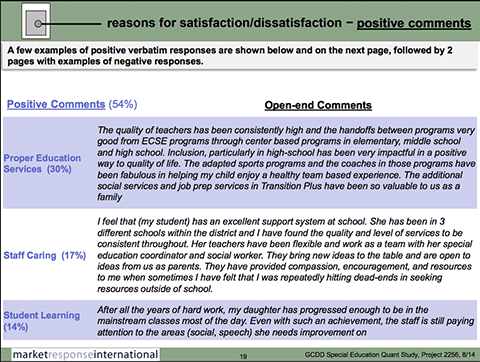2014: The Minnesota Special Education Experience Study – Survey Report
In 2014, the Minnesota Governor's Council on Developmental Disabilities and the Department of Education, Special Education Division, commissioned a study among households that have a student receiving special education services in Minnesota's public school system.
https://mn.gov/mnddc/extra/customer-research/special-education-experience-study.pdf
The purpose of the survey was to obtain quantitative benchmark measures of overall quality perceptions and satisfaction or dissatisfaction with the special education experience, as perceived by the parents and the students themselves, throughout the state of Minnesota. The questionnaire was provided in both English and Spanish and took approximately 20-30 minutes to complete.
- 1,705 parents completed the survey.
- Parents rated their experiences by number and also wrote comments sharing their own personal stories and examples.
Of the student respondents:
- 41% were in Primary School, Kindergarten through 5th grade.
- 24% were in Middle School, 6th through 8th grade.
- 32% were in High School, 9th through 12th grade.
The most prevalent IEP-qualifying disabilities represented in this survey were:
- 27% Autism Spectrum Disorder
- 13% Specific Learning Disability
- 13% Other Health Disability
- 12% Developmental Cognitive Disability
- 12% Emotional or Behavioral Disorder
- 11% Speech Language Impairment

Quality Ratings
When considering the overall quality of their special education experience in public schools:
- 43% were very satisfied.
- 31% somewhat satisfied.
- 20% were dissatisfied.
Overall Special Education Experience Rating:
With 1 being "poor" and 9 being "excellent," respondents rated the experience a 6.6, which is in between Good and Fair-Average.
Satisfaction Ratings
Comments from parents highlight each end of the satisfaction spectrum:
Positive: The quality of teachers has been consistently high and the handoffs between programs very good from ECSE programs through center based programs in elementary, middle school and high school. Inclusion, particularly in high-school has been very impactful in a positive way to quality of life. The adapted sports programs and the coaches in those programs have been fabulous in helping my child enjoy a healthy team based experience. The additional social services and job prep services in Transition Plus have been so valuable to us as a family.
Negative: The education that my son has received is below par, and has not met his needs. His teachers sometimes don't know he is on an IEP…they don't follow the IEP…he struggles and their main answer is putting him in a resource class…which has not helped at all this year…
Other Findings
- Satisfaction with the special education experience decreases as students move into the higher grades, beyond primary school.
- Urban areas (Minneapolis-St. Paul) scored the lowest satisfaction ratings, in comparison with other parts of the state.
- Approximately one-in-four (27%) households in the urban Minneapolis-St. Paul areas are dissatisfied with the public education experience, compared to about 1-in-5 overall.
- When a student was suspended for disrupting a class or other behavioral issue, over a third of the parents (36%) believed the suspension was an overreaction.
- 19% thought the use of suspension was an appropriate, effective response to their students' behavior.
These survey results serve as a benchmark and will be repeated in the future, so that progress can be measured over time.
For more information on Special Education in Minnesota in 2014, see the report entitled, "Recommendations For Special Education Case Load And Rule Alignment – Report of the Special Education Case Load Task Force Submitted to the Minnesota Legislature, February 15, 2014."

